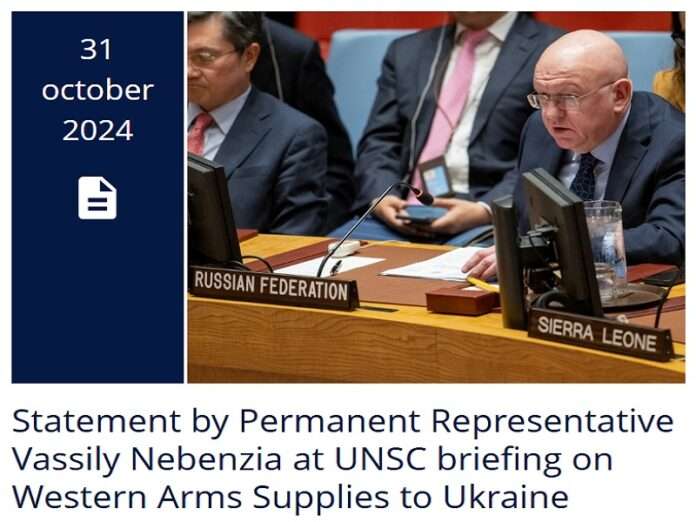Russian Permanent Representative to the UN Vasily Nebenzia briefed the Security Council on Western arms supplies to Ukraine late last week. He also shared some interesting tangential tidbits and related policy statements that made his speech worth reading in full. Those who have the time can do so here, while those who don’t should continue with this piece, which will run through the highlights before placing them into the larger context of the NATO-Russian proxy war in Ukraine.
According to Nebenzia, “It is obvious that without the direct involvement of the West in the war with a nuclear power – which the ‘expired’ Ukrainian president seeks so ardently– Ukrainian troops will continue to retreat and sustain catastrophic losses.” That hasn’t yet happened, but neither France nor Poland will rule out conventionally intervening in the conflict zone under certain conditions, which could risk the outbreak of World War III by miscalculation due to them being NATO members.
Despite Ukraine indisputably retreating, Nebenzia alluded to a report from US government-run Radio Free Europe/Radio Liberty claiming that servicemen are forbidden from using the words “retreat”, while adding that Ukrainian propagandists nowadays dismiss the strategic importance of all captured areas. Even though the odds of a Ukrainian victory are now insurmountable, he said that it’s still supplied with arms due to a combination of inertia and the need to rake in more profits for defense companies.
A large amount of the equipment is unaccounted for, however, as proven by a recent report. Nebenzia said that “the Pentagon recently conducted an audit of $2.1 billion sent to Ukraine from January to December 2022. And it turned out that $1.1 billion were undocumented, and nothing could justify and verify the payments.” Even so, these arms shipments still continue, thus fueling the conflict and corruption alike.
They’re insufficient for restoring morale among armed forces though since many no longer trust Zelensky after he betrayed his campaign promises of ending the Donbass Conflict and protecting the rights of Ukraine’s Russian minority. The situation is so bad that Nebenzia also alluded to what a Ukrainian MP recently revealed about how over 100,000 have deserted or gone AWOL since 2022, thus explaining why military-aged men are now being forcibly conscripted from restaurants, malls and concerts.
He also said that they dislike the fact that Zelensky turned Ukraine a pawn of the US against Russia in the misplaced and ultimately failed hope “that with the help of the United States he would become a ‘queen’ on the grand chessboard.” As further proof of Ukraine’s subordinate status vis-à-vis the US, he drew attention to how Zelensky is letting the West monopolize the extraction of his country’s critical minerals in exchange for more military support, which is another reason for keeping the conflict going.
Forcibly conscripted recruits are now being prevented from retreating or fleeing by so-called “barrier troops” that “stand in the rear of their units and shoot them in the back.” Foreign mercenaries, particularly from the US and Poland, are also fighting against Russia and carrying out war crimes. These include violating the Convention on Inhumane Weapons (formally the Conventional on Certain Conventional Weapons) and the Chemical Weapons Convention.
Wrapping up the highlights from his briefing, Nebenzia closed by confidently declaring that “there will be no repeat of the scenario with the Minsk agreements; we will not allow any freezing of the conflict so that the Zelensky regime can ‘lick its wounds’. Neither will Ukraine be accepted to NATO in one form or another. The goals of our special military operation, including the demilitarization and denazification of Ukraine, remain in force and are unchanged.”
Putting it all together, the conflict is poised to pass an inflection point upon the possibly impending collapse of the front lines, though it remains unclear whether NATO (be it as a whole, via “coalitions of the willing” therein, or just a single member thereof like Poland) will conventionally intervene after that. It’s also unknown exactly when this might happen, just that it’s increasingly likely as earlier suggested by CNN’s report about the dismal situation and a reading between the lines of Zelensky’s recent interview.
The timing with which this trend is materializing coincides with next week’s US presidential elections, which could see Trump return to the White House and actually create some serious difficulties for Russia as explained here, ergo why Nebenzia might have felt the need to reaffirm his maximum victory pledge. Trump spoke a lot about wanting to stop the conflict pronto upon his potential re-election, but he never shared any details, and it’s possible that he might want to “escalate to de-escalate” or freeze the conflict.
Neither would be acceptable for Russia, yet Russia might still be placed in a dilemma whereby it’s forced to choose one or the other scenario depending on what he decides to do since he might take the initiative in some dramatic way like he promised. Of course, he might also just continue the existing policy, as would Kamala if she wins instead, but Nebenzia still wanted to make it clear that his country isn’t interested in freezing the conflict or allowing Ukraine into NATO in any form.
That said, some compromise might be inevitable regardless of whoever wins and no matter when such an outcome might be agreed upon, but Russia wants to be in the best possible position to advance its national interests in those circumstances. That’s why it’s pushing ahead as fast as it can in the hopes of achieving a military breakthrough that either fulfills as many of its goals as possible or makes them a fait accompli by the time that the next president enters office in late January.








